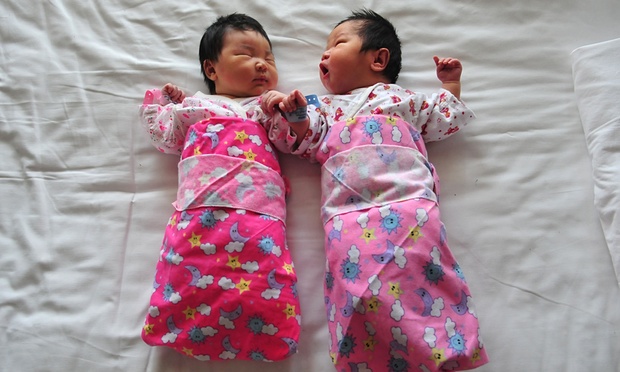China has scrapped its one-child policy, allowing couples to have two children for the first time in more than three decades, official media has reported.
The announcement was made at the close of a Communist party meeting focused on financial reforms and maintaining growth at a time of heightened concerns over the country’s economy.
China will “fully implement a policy of allowing each couple to have two children as an active response to an ageing population”, a statement published by Xinhua news agency on Thursday said. There were no immediate details on the new policy or a timeframe for its implementation.
For months there has been speculation that Beijing was preparing to abandon the divisive family planning rule, which was introduced by Communist party leaders in 1980 because of fears of a population boom.
The government credits it with preventing 400m births, but the human cost has been immense, with forced sterilisations and abortions, infanticide, and a dramatic gender imbalance that means millions of men will never find female partners.
China may bring in 'two-child policy' to tackle demographic timebomb
Read more
In 2012 – in one of the most shocking recent cases of human rights abuses related to the policy – a 23-year-old woman from Shaanxi province in north-west China was abducted by family planning officials and forced to have an abortion seven months into the pregnancy.
Opponents say the policy has also created a demographic “timebomb”, with China’s 1.3 billion-strong population ageing rapidly, and the country’s labour pool shrinking. The UN estimates that by 2050 China will have about 440 million people over 60. The working-age population – those between 15 and 59 – fell by 3.71 million last year, a trend that is expected to continue.
News that the one-child policy has been abandoned comes three months after one Chinese newspaper predicted the policy would be phased out by the end of this year. At the time those reports were denied by the Chinese government.
In recent years, there has been a gradual relaxation of China’s family planning laws, which already permitted minority ethnic families and rural couples whose firstborn was a girl to have more than one child.
Since 2013, couples in many parts of the country have been allowed to have two children if one parent was an only child.
Steve Tsang, professor of contemporary Chinese studies at the University of Nottingham, said Beijing was attempting to confront an impending demographic crisis.
“It is long overdue. It’s definitely the right direction but I think its impact is going to be rather less than would [initially] appear,” he said, adding that the change would help reduce the number of human rights abuses committed in the policy’s name.
Tsang said ending the policy was unlikely to convince reluctant urban couples to have more children, and would do little to immediately solve the gender imbalance which has resulted from decades of selective abortions by parents who preferred sons to daughters.
China's one-child policy – timeline
Read more
“The gender imbalance is going to be a very major problem – we are talking about between 20 million and 30 million young men who are not going to be able to find a wife. That creates social problems and that creates a huge number of frustrated people,” Tsang said.
Dai Qing, a Chinese writer who has publicly called for the one-child policy to be scrapped, said Thursday’s announcement was a positive step. “It shows that the authorities have understood the changes in the total population and the demographic structure and started to address them,” she said.
Dai said questions remained, particularly about how the Communist party would enforce its new two-child policy.
“Even if people are allowed to have two children, what if they want to have three children or more? What if unmarried women want to have their own children? At the end of the day, it’s about women’s reproductive rights and freedoms.”
Stuart Gietel-Basten, a University of Oxford demographer who has also argued for the end of the policy, said the announcement had come earlier than expected.
“I’m shaking to be honest. I’m a little bit shaken up,” he said. “It’s one of those things that you have been working on and saying for years and recommending they should do something and it finally happened. It’s just a bit of a shock.
“The insider chat … was that it was likely to be some time next year so I was quite surprised.”
Gietel-Basten said the rule change was unlikely to have a major long-term demographic impact. “In the short term, probably there will be a little baby boom particularly in some of the poorer provinces where the rules have been very strict, like in Sichuan or in parts of the south. But in the long term I don’t think it’s going to make an enormous amount of difference.”
The end of the one-child policy would be good news for both Chinese people and the country’s Communist party leaders, he said.
“In some ways, from a political, pragmatic perspective, loosening the policy is good for the party but also it is a good thing for individual couples who want to have that second child. It is a kind of win-win for everybody.”
Gietel-Basten added: “Millions of ordinary Chinese couples will be allowed to have a second child if they want to – this is clearly a very positive thing. As a demographer it is OK. It’s no big deal … but on a very human level the capacity for parents to have a second child if they want to … is obviously very important.”
Fuente: www.theguardian.com
